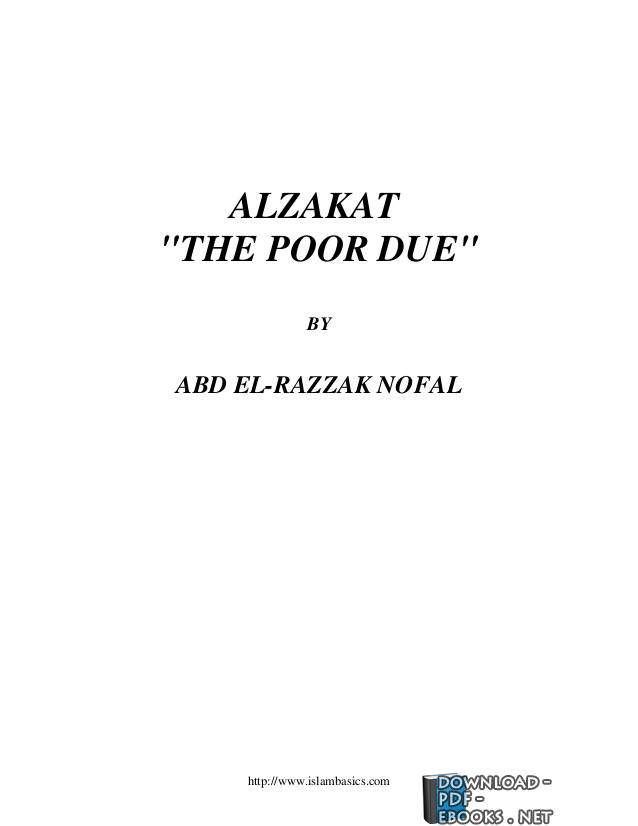📘 قراءة كتاب The Poor Due (Al Zakat) الزكاة أونلاين


The Poor Due (Al Zakat) الزكاة من Islamic Books
The Poor Due (Al Zakat) الزكاة من Islamic Books
The Poor Due) Al Zakat) - الزكاة
المؤلف: Abd El-Razzak Nofal_عبد الرزاق نوفل
Quran
The Quran discusses charity in many verses, some of which relate to zakat. The word zakat, with the meaning used in Islam now, is found, for example, in suras: 7:156, 19:31, 19:55, 21:73, 23:4, 27:3, 30:39, 31:4 and 41:7.[26][27] Zakat is found in the early Medinan suras and described as obligatory for Muslims.[25] It is given for the sake of salvation. Muslims believe those who give zakat can expect reward from God in the afterlife, while neglecting to give zakat can result in damnation. Zakat is considered part of the covenant between God and a Muslim.[25]
Verse 2.177 (Picktall translation) sums up the Quranic view of charity and alms giving (Another name for Zakat is the "Poor Due"):
It is not righteousness that ye turn your faces to the East and the West; but righteous is he who believeth in Allah and the Last Day and the angels and the Scripture and the Prophets; and giveth his wealth, for love of Him, to kinsfolk and to orphans and the needy and the wayfarer and to those who ask, and to set slaves free; and observeth proper worship and payeth the poor due. And those who keep their treaty when they make one, and the patient in tribulation and adversity and time of stress. Such are they who are sincere. Such are the God fearing. - 2:177
According to Yusuf al-Qaradawi, verse 9.5 of the Quran[28] makes zakat one of three prerequisites for pagans to become Muslims: "but if they repent, establish prayers, and practice zakat they are your brethren in faith".[7] Although, this verse seems to generally list qualities that identify a "brethren in faith" to a Muslim.
The Quran also lists who should receive the benefits of zakat, discussed in more detail below.[29]
Hadith
Each of the most trusted hadith collections in Islam have a book dedicated to zakat. Sahih Bukhari's Book 24,[30] Sahih Muslim's Book 5,[31] and Sunan Abu-Dawud's Book 9[32] discuss various aspects of zakat, including who must pay, how much, when and what. The 2.5% rate is also mentioned in the hadiths.[33]
The hadiths admonish those who do not give the zakat. According to the hadith, refusal to pay or mockery of those who pay zakat is a sign of hypocrisy, and God will not accept the prayers of such people.[34] The sunna also describes God's punishment for those who refuse or fail to pay zakat.[35] On the day of Judgment, those who did not give the zakat will be held accountable and punished.[29]
The hadith contain advice on the state-authorized collection of the zakat. The collectors are required not to take more than what is due, and those who are paying the zakat are asked not to evade payment. The hadith also warn of punishment for those who take zakat when they are not eligible to receive it (see Distribution below).[29]
سنة النشر : 1993م / 1413هـ .
حجم الكتاب عند التحميل : 2.8 ميجا بايت .
نوع الكتاب : pdf.
عداد القراءة:
اذا اعجبك الكتاب فضلاً اضغط على أعجبني و يمكنك تحميله من هنا:

شكرًا لمساهمتكم
شكراً لمساهمتكم معنا في الإرتقاء بمستوى المكتبة ، يمكنكم االتبليغ عن اخطاء او سوء اختيار للكتب وتصنيفها ومحتواها ، أو كتاب يُمنع نشره ، او محمي بحقوق طبع ونشر ، فضلاً قم بالتبليغ عن الكتاب المُخالف:
 قبل تحميل الكتاب ..
قبل تحميل الكتاب ..
يجب ان يتوفر لديكم برنامج تشغيل وقراءة ملفات pdf
يمكن تحميلة من هنا 'http://get.adobe.com/reader/'


 منصّة المكتبة
منصّة المكتبة